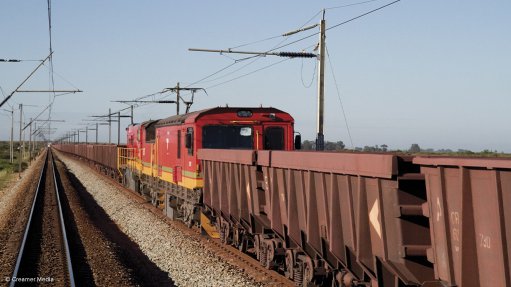
Photo by: Creamer Media
Anglo American subsidiary Kumba Iron Ore CE Mpumi Zikalala has reiterated that State-owned Transnet’s rail performance challenges have placed so much pressure on Kumba’s value chain that the company has had to moderate its production rates.
Following the completion of the yearly logistics maintenance shutdown by Transnet in October last year, Kumba’s iron-ore railed to the Saldanha Bay Port decreased by 19% in the fourth quarter compared with the third quarter, resulting in on-mine stockpiles increasing to unsustainable levels, Zikalala said at the release of Kumba’s production and sales report for the fourth quarter and year ended December 31, 2023.
The resulting moderation of production rates led to volumes decreasing by 26% to 7.2-million tonnes from 9.7-million tonnes in the third quarter of last year. This decrease in production allowed a 700 000 t drawdown of on-mine stock from 7.2-million tonnes in the third quarter to 6.5-million tonnes in the fourth quarter.
As such, the total finished product reduced from nine-million tonnes in the third quarter to 7.1-million tonnes in the fourth quarter, while sales increased by 5% quarter-on-quarter to 9.3-million tonnes.
For the 2023 full-year, Kumba produced 35.7-million tonnes and sold 37.2-million tonnes of iron-ore, in line with its revised guidance of 35-million to 36-milliontonnes and 36-million to 37-million tonnes respectively.
“Despite lower production volumes, C1 unit costs improved to $41/t below our revised guidance of about $42/t, largely driven by rand weakness and cost savings, with Kolomela, in particular, demonstrating better cost performance,” Zikalala said on February 8.
She explained that, in the last quarter of 2023, iron-ore prices strengthened on the back of tight market fundamentals, including low port inventories and demand supported by government stimulus announcements and steel exports from China.
Higher lump premium owing to low lump stocks and sintering cuts further contributed to Kumba’s average realised price of $117/wmt for the year, 15% above the benchmark price of $102/wmt.
“A comprehensive business review was conducted in the second half of 2023 with the aim of reconfiguring the business and aligning production more closely to the prevailing logistics capacity to ensure the long-term sustainability of our business,” Zikalala revealed.
She said the company remained supportive of the key measures being undertaken by the National Logistics Crisis Committee, specifically the halt of the continued decline in Transnet’s rail performance and improvement of the capacity of the iron-ore export channel.
However, owing to a significant amount of work required to turn the situation around over time, Zikalala said the logistics network could be expected to remain constrained over the medium term.
As a result, Kumba has revised its production guidance for the three-year period from 2024 to 2026 to between 35-million and 37-million tonnes a year, with the expected C1 unit costs revised to between $38/t and $40/t, reflecting the benefit of Kumba’s business reconfiguration and optimisation programme.